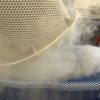The Cryogenic Institute of New England, Inc. will be exhibiting at the Rubber Expo 2009 & 76th Technical Meeting in Pittsburgh, PA for three days this month. The Rubber Expo…
Read More
In these interesting economic times, it is hard to get the funding to replace molds and their associated tooling. It is understandable for companies to replace their molds as it…
Read More
One of our service offerings, cryogenic deflashing has seen a major spike in orders lately. Many customers with silicone and rubber parts are utilizing cryogenic deflashing to clean any excess…
Read More
Since the turn of the New Year, we have seen an influx of medical customers seeking cryogenic deflashing for molded parts and cryogenic deburring for machined parts. These two services…
Read More





